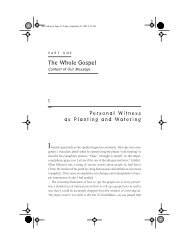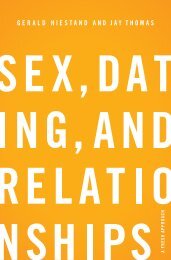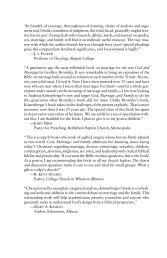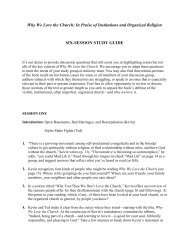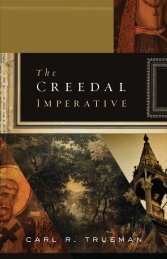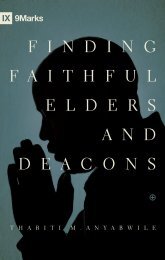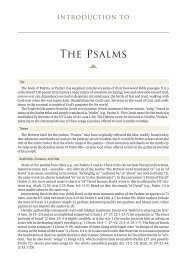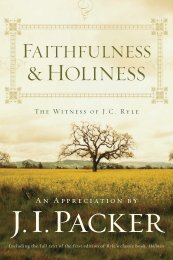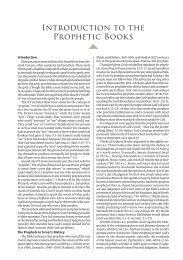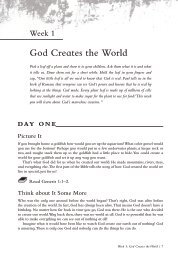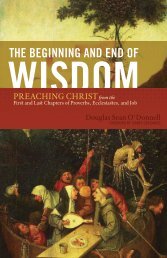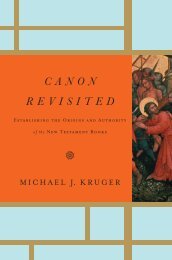JUSTIFIED - Monergism Books
JUSTIFIED - Monergism Books
JUSTIFIED - Monergism Books
- No tags were found...
Create successful ePaper yourself
Turn your PDF publications into a flip-book with our unique Google optimized e-Paper software.
<strong>JUSTIFIED</strong><br />
Essays on the Doctrine of Justification<br />
EDITED BY<br />
RYAN GLOMSRUD AND<br />
MICHAEL S. HORTON<br />
“He also told this parable to some who trusted in themselves that they were<br />
righteous, and treated others with contempt: ‘Two men went up into the temple<br />
to pray, one a Pharisee and the other a tax collector.<br />
The Pharisee, standing by himself, prayed thus:<br />
“God, I thank you that I am not like other men, extortioners, unjust, adulterers,<br />
or even like this tax collector. I fast twice a week; I give tithes of all that I get.”<br />
But the tax collector, standing far off, would not even lift up his eyes to heaven,<br />
but beat his breast, saying, “God, be merciful to me, a sinner!”<br />
I tell you, this man went down to his house justified, rather than the other.’”<br />
(Luke 18:9–14)<br />
MODERN REFORMATION<br />
© 2010 Modern Reformation
Contents<br />
List of Contributors 1<br />
Introduction—Getting Perspective 3<br />
RYAN GLOMSRUD<br />
COVENANT AND JUSTIFICATION<br />
1 Engaging N.T. Wright and John Piper 11<br />
MICHAEL S. HORTON<br />
LAW AND FAITH<br />
2 Confusion about the Law in Paul 33<br />
T. DAVID GORDON<br />
3 Does Faith Mean Faithfulness 40<br />
SIMON GATHERCOLE<br />
4 The Nature of Justifying Faith 47<br />
DAVID VANDRUNEN<br />
5 An American Tragedy: Jonathan Edwards on Justification 53<br />
GEORGE HUNSINGER<br />
SHALL WE STILL PROTEST THE DEBATE WITH ROME<br />
6 Not by Faith Alone: The Roman Catholic Doctrine of Justification 58<br />
AN INTERVIEW WITH ROBERT SUNGENIS<br />
7 What “Evangelicals and Catholics Together” Ignores:<br />
The Inseparable Link Between Imputation and the Gospel 65<br />
R. C. SPROUL<br />
8 Ten Propositions on Faith and Salvation 72<br />
EDITED BY MICHAEL S. HORTON<br />
9 The Doctrine of Justification:<br />
The Article on which the Church Stands or Falls 74<br />
J. A. O. PREUS III
Contents<br />
UNION AND PEACE WITH GOD<br />
10 A More Perfect Union Justification and Union with Christ 78<br />
JOHN V. FESKO<br />
11 Christ at the Center: The Legacy of the Reformed Tradition 85<br />
DENNIS TAMBURELLO<br />
12 The Discomfort of the Justified Life 91<br />
JERRY BRIDGES<br />
13 Holiness: God’s Work or Ours 95<br />
HAROLD L. SENKBEIL<br />
Conclusion—Does Justification Still Matter 102<br />
MICHAEL S. HORTON
Contributors<br />
JERRY BRIDGES is an author and conference speaker. He has been on the staff of<br />
The Navigators for over fifty years and currently serves in the Collegiate Mission.<br />
JOHN V. FESKO is associate professor of systematic theology at Westminster<br />
Seminary California in Escondido, California.<br />
SIMON GATHERCOLE is lecturer in New Testament studies and fellow at<br />
Fitzwilliam College, University of Cambridge, United Kingdom.<br />
RYAN GLOMSRUD is a Postdoctoral Fellow in the history department at Harvard<br />
University, executive editor of Modern Reformation magazine, and author of<br />
scholarly articles on historical theology and modern European intellectual<br />
history.<br />
T. DAVID GORDON is a minister in the Presbyterian Church in America and<br />
associate professor of religion at Grove City College in Grove City, Pennsylvania.<br />
MICHAEL S. HORTON is the J. Gresham Machen Professor of Systematic<br />
Theology and Apologetics at Westminster Seminary California, host of the<br />
White Horse Inn national radio broadcast, and editor-in-chief of Modern<br />
Reformation magazine.<br />
GEORGE HUNSINGER is the Hazel Thompson McCord Professor of Systematic Theology<br />
at Princeton Theological Seminary.<br />
J. A. O. PREUS III is executive vice president for Mission Advancement for<br />
Bethesda Lutheran Communities in Watertown, Wisconsin.<br />
HAROLD L. SENKBEIL is executive director for spiritual care with Doxology, The<br />
Lutheran Center for Spiritual Care and Counsel.<br />
R. C. SPROUL is the founder and chairman of Ligonier Ministries in Orlando,<br />
Florida.<br />
DENNIS E. TAMBURELLO, OFM, is professor of religious studies at Siena<br />
College in Loudounville, New York.<br />
DAVID VANDRUNEN is the Robert B. Strimple Professor of Systematic Theology and<br />
Christian Ethics at Westminster Seminary California in Escondido, California.
INTRODUCTION<br />
Getting Perspective<br />
RYAN GLOMSRUD<br />
Compared with the “Battle for the Bible,” sola fide has not loomed large as<br />
a topic of conversation in evangelical circles in the past. The formal cause<br />
of the Reformation, Scripture alone, captured evangelical attention from<br />
the 1950s more than the formal cause, justification by faith alone. And yet, one of<br />
the many flashpoints in evangelicalism in recent years has been between leading<br />
Baptist minister John Piper and Anglican Bishop N. T. Wright who are very<br />
much at odds, not on Scripture, but on the substance of biblical soteriology or the<br />
doctrine of salvation.<br />
Wright has produced several volumes of biblical-theological work at the lay<br />
and academic level, many of which are controversial in their own right; but the<br />
rising public dispute began with Piper’s The Future of Justification: A Response to N.<br />
T. Wright (Crossway, 2007) and continued with Wright’s rejoinder, an elaboration<br />
of key Pauline teachings in Justification: God’s Plan & Paul’s Vision (IVP, 2009). Neither<br />
book pulls any punches and in places the side discussion is harsh: for Piper,<br />
biblical orthodoxy is at stake, and Wright returns fire by comparing critics such<br />
as Piper to flat-earthers, even Pharisees. 1<br />
Ironically, Wright and others are critical of overly “introspective” Protestants<br />
for having cast themselves in the role of “Paul” and the medieval church doctors<br />
as “Pharisees” at the time of the Reformation; yet Wright now has little trouble<br />
placing himself in the apostle’s shoes against his “old perspective” agitators.<br />
“Someone in my position,” he writes, “is bound to have a certain fellow-feeling<br />
with Paul in Galatia. He is, after all, under attack from his own right wing.” 2<br />
Within broader evangelicalism, however, the fever-pitch at which this debate is<br />
sometimes argued is not, one suspects, because of either Piper’s or Wright’s intense<br />
argumentation and escalating rhetoric, but because the topic is keenly felt<br />
to have been at issue well before the clash of these two evangelical leaders. In<br />
other words, the justification debate in evangelicalism actually goes back much<br />
earlier than the arrival of the New Perspective on Paul.<br />
The five “solas” of the Reformation were at one time the consensus of Protestantism.<br />
Converging in the doctrine of justification, we are saved by grace alone<br />
(sola gratia) through faith alone (sola fide) because of Christ alone (solus Christus)<br />
all for God’s glory alone (soli Deo Gloria), a message of good news that is revealed<br />
to us in Scripture alone (sola scriptura). Over the past number of years, unfortunately,<br />
evangelicals have been divided on these otherwise unifying truths, tending<br />
to associate what was once the lifeblood of the evangelical movement with<br />
merely “getting saved.” While some evangelicals, including many teachers and<br />
high-profile pastors, have directly attacked the old Protestant consensus, undermining<br />
specifically the doctrine of justification, other rank-and-file believers have<br />
3
INTRODUCTION<br />
simply come to believe that there should be a different emphasis in evangelical<br />
media on personal and social renewal, or on the transformative aspect of salvation—namely,<br />
sanctification—rather than the declarative aspect—God’s justification<br />
of the ungodly. Being reckoned righteous in Christ is for many a mere<br />
preface to the central message of the need to become more Christ-like, a trend<br />
moving in the direction of spirituality and discipleship. And finally, there are<br />
self-identified evangelicals who have never even heard of the “solas” of the Reformation,<br />
much less the imputation of Christ’s righteousness that is the crux of<br />
justification. Whether rejected outright, neglected, or simply unknown, it is evident<br />
that the gospel as traditionally understood has fallen on hard times.<br />
Over the past thirty years debates over the doctrine of justification, though<br />
quieter than other controversies, have nonetheless been many and varied. There<br />
is no one history to which Modern Reformation can draw your attention. Suffice<br />
it to say, Wright, James Dunn, and E. P. Sanders (representative of the New Perspective<br />
on Paul) are not the cause of the present controversy. Rather, they represent<br />
at best a contemporaneous phenomenon that has in some ways<br />
galvanized evangelicals who were already conflicted over how to understand<br />
both the big-picture interpretation of the Bible, otherwise called biblical theology,<br />
as well as crucial exegetical details—in particular the scriptural teaching on<br />
law, justification, righteousness, faith, and the nature of God’s interaction with<br />
his people in the time of Abraham and Moses. In the end, it matters little if we<br />
can pinpoint whether the slow rise of justification debates occurred before or at<br />
the same time as the New Perspective. The point is that similar debates have<br />
been playing out among Christian college Bible faculties, on evangelical seminary<br />
campuses, in some of the more purportedly “doctrinaire” denominations, and<br />
even at meetings (past and present) of the Evangelical Theological Society,<br />
mostly without reference to Wright or the disparate group of scholars working<br />
on Second Temple Judaism and the interpretation of the New Testament. It is<br />
therefore important to gain a proper perspective on our current situation. In<br />
these selections from Modern Reformation, a combination of new and classic articles,<br />
we want to present a few catalyzing arguments that have the potential to<br />
move forward what we think is a stalled debate in evangelicalism and the wider<br />
world of New Testament studies.<br />
Leaving Dispensationalism Behind<br />
There is a great deal of complexity to the history of evangelical theology, more<br />
than can possibly be summed up in a brief introduction. Among the various factors<br />
we could call to mind, the emergence of a post-dispensationalist evangelical<br />
academy is one that is not typically acknowledged. Classic premillennial dispensationalism,<br />
as many will know, had a unique way of carving up the biblical narrative<br />
from Genesis to Revelation, and is still without question a very popular<br />
way of interpreting the Bible among laity. But with the flourishing of “neo-evangelical”<br />
institutions such as Christian colleges, seminaries, and publishing companies<br />
over the past thirty years, dispensationalism has slowly retreated from<br />
dominance among the teachers and scholars who labor to train the next gener-<br />
4
GETTING PERSPECTIVE<br />
ation of leaders. In its place, there has been an emphasis on the unity of the biblical<br />
story. This effort amounted to an attempt to flatten the contours of redemptive<br />
history and shave off the rough edges of the starkly delimited covenant<br />
“dispensations” known to previous generations. Without necessarily revising<br />
evangelical eschatology or end-times views, evangelicals now predominantly<br />
identify one story of “grace” from beginning to end. One is tempted to explain<br />
this shift in terms of “lumping” and “splitting,” general categories that are sometimes<br />
helpful in getting one’s bearings. For better or worse, the overcoming of<br />
dispensationalism’s exegetical “splitting” or compartmentalizing of redemptive<br />
history into seven relatively discrete and non-overlapping covenants has given<br />
way to a new “lumping” mentality, or what some of the authors in this volume<br />
will refer to as “mono-” or “one-covenantalism,” which essentially groups together<br />
God’s successive redemptive acts into one large, reductionist covenant.<br />
Where the old dispensational consensus identified difference in a transition from<br />
law to grace, post-dispensational evangelicals recognize mostly (and sometimes<br />
exclusively) unity in a movement of uninterrupted grace.<br />
In this evangelical shift, several crucial Reformation themes—some of which<br />
never sat very well with dispensationalists either—have become more and more<br />
controversial. If the accent in evangelical biblical theology is no longer on the<br />
contrast between works and grace, old and new, as understood by various Reformation<br />
Protestants, then traditional distinctions between law and gospel, faithfulness<br />
and faith, and Moses and Abraham have also fallen by the wayside.<br />
Because of the predominance of evangelical mono-covenantalism of various<br />
kinds, Reformation perspectives are now at the periphery of the most recent justification<br />
debate, and even defenders of justification neglect the full range of the<br />
early Protestant tradition’s biblical-theological resources. Two general points are<br />
worth elaboration before introducing the contributions of this volume.<br />
The In-House Debate<br />
The current debate has every appearance of being centered on those scholars<br />
working from a post-dispensationalist set of presuppositions. In fact, one is<br />
tempted to construe the in-house evangelical debate over justification as a conflict<br />
between those who are working to hash out the details of this move to highlight<br />
the unity of the Bible.<br />
Here one thinks especially of the legacy of Daniel P. Fuller, son of the cofounder<br />
of Fuller Seminary, former professor of the same from 1953 to 1993,<br />
and teacher of several generations of biblical scholars who now work at a variety<br />
of evangelical institutions. Others could be cited and influence is difficult to<br />
trace, but there is widespread agreement among Fuller’s “students,” loosely understood,<br />
on a number of key issues. 1) It is assumed that the Reformation distinction<br />
between law and gospel somehow smacks of older dispensationalism and<br />
therefore cannot (and should not) be reconciled with a post-dispensationalist<br />
narrative of “grace” and continuity. 2) It follows that the Reformation understanding<br />
of grace must surely have been slightly antinomian or insufficiently concerned<br />
with the need to obey the law or pursue sanctification and holy living;<br />
5
INTRODUCTION<br />
in other words, the Reformation is frequently caricatured as having relegated or<br />
pushed faithfulness and obedience to an obsolete “law” covenant, leaving a<br />
deficit in evangelical preaching of exhortations to keep the law. 3) Further, it is<br />
sometimes said that the Reformation understanding of faith was similarly onesided<br />
in emphasis—in this case “intellectualist” or insufficiently personal because<br />
it allegedly did not include the renovation of moral behavior. These are simply<br />
part of the air that is breathed in our post-dispensationalist context, and in fact<br />
most of these claims were either stated explicitly or indirectly hinted at in two<br />
of Fuller’s books: first his Gospel and Law: Contrast or Continuum: The Hermeneutics<br />
of Dispensationalism and Covenant Theology, and then the summation of his life’s<br />
teaching in The Unity of the Bible: Unfolding God’s Plan for Humanity. 3 Addressing<br />
the doctrine of justification, Fuller concluded that in light of his redrawing of<br />
the covenantal map and revision of these key issues, one should be ready to affirm<br />
that “justification depends on persevering faith” or faithfulness. 4 This view is<br />
now widespread in evangelicalism and shares much in common with Wright’s<br />
interpretation of biblical teaching on salvation without having been learned from<br />
him directly.<br />
The justification debate has not fallen along Arminian versus Calvinist lines,<br />
as it might have in the past, for many of Fuller’s heirs are in fact restlessly<br />
“Calvinist.” That is, they are drawn to the theme of God’s sovereignty over all<br />
things and are eager to explain the doctrine of perseverance in grace-centered or<br />
even “Augustinian” terms. Many post-dispensationalist exegetes are neither<br />
Pelagian nor semi-Pelagian, but frequently engage in discussions about whether<br />
to self-identify as four-, five-, six-, or even seven-point Calvinists! In fact, there<br />
have even been those within properly Reformed denominations who have taken<br />
up this discussion, such as Norman Shepherd (formerly of Westminster Theological<br />
Seminary in Philadelphia). To the extent that Shepherd and other Reformed<br />
theologians attempted to integrate with evangelicalism and negotiate<br />
with older dispensationalist interpretations of the Bible, they made a corresponding<br />
attempt to weaken classic Reformed distinctions between the<br />
“covenant of works” and the “covenant of grace.”<br />
The Missing Element<br />
Fortunately, many evangelicals have ably defended the doctrine of imputation,<br />
the great double exchange whereby our sins are reckoned to Christ on the<br />
cross and his righteousness is accounted to us that we might have life (2 Cor.<br />
5:21). This double imputation is the very essence of the Protestant understanding<br />
of justification. However, not all imputational schemes have been set in the<br />
context of the Reformation tradition’s fully developed biblical theology, a fact<br />
that owes much to the emergence of the mono-covenantalism I have been describing.<br />
What many post-dispensationalist theologians share in common, therefore,<br />
including the “Calvinists”—and in fact what Piper shares in common with<br />
Wright—is what they are missing, namely, an extended engagement with classic<br />
covenant theology. There are genuine exegetical insights available in this Reformation<br />
tradition, especially when it comes to negotiating continuity and<br />
6
GETTING PERSPECTIVE<br />
discontinuity in the history of redemption. Going forward in a discussion sometimes<br />
requires looking back in order to discern what was missing at the outset.<br />
In our context today, we could benefit from returning to the tradition probably<br />
least thought of as holding any hope for the resolution of the justification debate:<br />
the Reformation tradition. And yet, that is the aim of this volume. In these pages<br />
we bring together Lutheran, Reformed, and Baptist theologians and biblical<br />
scholars who are able to unpack Reformational perspectives for thoughtful nonspecialists.<br />
Covenant and Justification<br />
To begin this volume, Modern Reformation editor-in-chief and White Horse Inn<br />
radio co-host Michael Horton (re)introduces the basics of Reformed biblical theology<br />
so as to set justification in its proper and essential redemptive-historical<br />
context, thereby reinforcing the plausibility and importance of the Reformation<br />
“solas” for evangelical theology. 5 In chapter 1, Horton upsets the cart by engaging<br />
directly with both Wright and Piper on precisely the issues discussed thus<br />
far. While he deeply appreciates Piper’s defense of imputation, Horton finds validity<br />
in several of Wright’s criticisms of the lack of sweeping biblical theology, especially<br />
the diminutive importance of the Abrahamic covenant. Wright’s<br />
rhetorically powerful description of the climax of the covenants and his vision<br />
of eschatological promise and fulfillment continue to be issues even for those<br />
who are otherwise sympathetic to Piper’s defense of justification. Drawing from<br />
surprising sources, including Jewish scholar Jon D. Levenson and Pope Benedict<br />
XVI, Horton shows that a good deal of scholarship actually points away from<br />
mono-covenantalism—a point on which Piper and Wright would seem united,<br />
in contrast to the Reformed tradition—and toward a distinction between the<br />
Abrahamic and the Mosaic covenants.<br />
Classic covenant theology is not a via media, or middle way, between two different<br />
kinds of mono-covenantalism, but a different theology entirely. Without<br />
sacrificing the grand redemptive-historical narrative, Horton uses covenant theology<br />
to address the relationship between the Old and New Testaments, as well<br />
as specific theological questions such as the relationships between faith and obedience,<br />
the legal and the relational, and law and gospel. Horton’s constructive<br />
presentation offers an alternative perspective that Piper has not fully embraced<br />
and Wright has not sufficiently considered. 6<br />
Law and Faith<br />
A proper understanding of law and gospel is fundamental for a vigorous defense<br />
of the doctrine of justification because it builds these categories up from the<br />
history of the covenants revealed in Scripture. Nonetheless, there are multiple<br />
uses of the term law in both biblical and non-canonical writings. It is therefore<br />
important to clear up confusion about the law that sometimes occurs in evangelical<br />
(and Reformed) scholarship. This is a particular specialty of T. David Gordon,<br />
professor of religion and Greek at Grove City College, who further sets the<br />
stage in chapter 2.<br />
7
INTRODUCTION<br />
It is difficult to overestimate the importance of the definition of faith in the ongoing<br />
evangelical debate. Is faith synonymous with faithfulness Does faith have<br />
its potency or efficacy because of its object, Christ, or because of its subject, the<br />
believer who has faith and perseveres in obedience In chapter 3, Simon Gathercole<br />
of the University of Cambridge and expert in early Christian studies offers us a<br />
concise survey of options in preparation for David VanDrunen’s more dogmatic<br />
treatment of justifying faith in chapter 4. These chapters work together as Van-<br />
Drunen, professor of systematic theology and Christian ethics at Westminster<br />
Seminary California, harnesses solid exegesis for a Reformational account of the<br />
“instrument” of justification.<br />
Within American evangelicalism, however, there is a great deal of confusion<br />
even among Calvinists over this definition of justifying faith, some of which<br />
arises from a surprising source: the writings of the New England revivalist<br />
Jonathan Edwards. There have been numerous attempts to parse Edwards’ understanding<br />
of faith found in his famous Treatise on Justification, and doubtlessly<br />
there will be many more due to his enduring popularity. But Princeton Theological<br />
Seminary professor George Hunsinger offers the best straightforward<br />
analysis of Edwards available. In chapter 5 Hunsinger cuts to the chase and explains<br />
how Edwards is less reliable at points than traditional Reformed interpretations.<br />
This is not offered to alienate those who would call Edwards their<br />
“homeboy,” as some t-shirts boast, but for the sake of redirecting some restless<br />
Calvinists away from an ambiguous text to the clarity of the earlier Reformed tradition,<br />
such as Calvin himself, the later Genevan theologian Francis Turretin, or<br />
even the writings of the biblical theologian Herman Witsius. 7 This reading of Edwards<br />
will be controversial, yet it is important to recognize where Reformation<br />
traditions begin and end in order to advance the discussion.<br />
Shall We Still Protest The Debate with Rome<br />
In the next section, we explore how these topics have been taken up in the<br />
revival of ecumenical discussions between evangelicals and Roman Catholics.<br />
There is perhaps no better way to see the similarities and differences between<br />
mono-covenantalist doctrines of justification and the official Roman view as defined<br />
by the Council of Trent than by a fact-finding interview with Catholic apologist<br />
Robert Sungenis (chapter 6). Sungenis converted from Catholicism to<br />
Protestantism in his youth, studied at a Reformed seminary under Norman Shepherd,<br />
and has since returned to Rome. Chapter 7 features a critique of “Evangelicals<br />
and Catholics Together” initiatives by R. C. Sproul of Ligonier Ministries.<br />
This classic article restates the doctrine of imputation and points out the studied<br />
ambiguity on imputation that is at the heart of these various joint Protestant and<br />
Catholic declarations on salvation. Chapter 8 comprises a list of ten propositions<br />
on faith and salvation that reinforce Sproul’s concerns for theological precision<br />
on faith, imputation, justification, and sanctification, all to help you know what<br />
you believe and why you believe it. Finally, in chapter 9, Lutheran statesman J.<br />
A. O. Preus III reminds us that the doctrine of justification is the article on which<br />
the Christian church either stands or falls.<br />
8
GETTING PERSPECTIVE<br />
Union and Peace with God<br />
Corresponding to the lumping and flattening of redemptive history by monocovenantalists,<br />
there has been an attempt to replace the classical Protestant order<br />
of salvation with a single doctrine of believers’ union with Christ. While the latter<br />
is certainly a crucial biblical doctrine, Westminster Seminary California professor<br />
John V. Fesko argues in chapter 10 that union with Christ should not be<br />
used to blur important distinctions between Christ’s active and passive obedience,<br />
and justification and sanctification. Here Fesko engages Wright and representatives<br />
of the Federal Vision, another movement that parallels without<br />
directly drawing from the New Perspective on Paul.<br />
We then turn in chapter 11 to Calvin scholar Dennis Tamburello, a Roman<br />
Catholic and professor at Sienna College who offers an outsider’s perspective on<br />
the legacy of the Reformed tradition for Christian theology. There is no special<br />
pleading here, and this reflection sets up a transition from the doctrine of justification<br />
to two concluding chapters on the promises and realities of the justified<br />
life by Jerry Bridges from The Navigators (chapter 12) and Harold J. Senkbeil<br />
from Concordia Theological Seminary (chapter 13). Personal holiness has always<br />
been a priority for Reformation Protestants, because God in his grace always<br />
produces fruit in the life of the justified sinner. Michael Horton has final<br />
word in the conclusion, leaving you with challenging answers to an ultimate<br />
and provocative question: Does justification still matter<br />
Modern Reformation has discussed these and many other important themes in<br />
every issue of our magazine going back twenty years. Readers who are familiar<br />
with us will not be surprised to read that we continue to believe that Reformation<br />
theology, rather than a hindrance, could actually be a great biblical resource for<br />
the present reform of our churches. If you are learning about us for the first<br />
time, we eagerly invite you to rally with us around the “solas” of the Reformation<br />
for the good of contemporary evangelicalism.<br />
1<br />
N. T. Wright, Justification: God’s Plan & Paul’s Vision (Downers Grove: IVP Academic,<br />
2009), 19, 20.<br />
2<br />
Wright, 112.<br />
3<br />
Daniel P. Fuller, Gospel and Law: Contrast or Continuum (Grand Rapids: Eerdmans,<br />
1980); The Unity of the Bible: Unfolding God’s Plan for Humanity (Grand Rapids: Zondervan,<br />
1992).<br />
4<br />
Fuller, The Unity of the Bible, 310 (emphasis added).<br />
5<br />
Readers may also want to reference Michael Horton, Introducing Covenant Theology<br />
(Grand Rapids: Baker <strong>Books</strong>, 2009).<br />
6<br />
A sophisticated account can be found in Michael S. Horton, Covenant and Salvation:<br />
Union with Christ (Louisville, KY: Westminster John Knox Press, 2007).<br />
7<br />
See, for example, Herman Witsius, The Economy of the Covenants Between God and Man:<br />
Comprehending a Complete Body of Divinity (Charleston, SC: Nabu Press, 2010).<br />
9
Information on White Horse Inn<br />
White Horse Inn (www.whitehorseinn.org) is a multimedia catalyst for reformation.<br />
Our mission is to help Christians “know what they believe and why they<br />
believe it” through conversational theology. The conversations take place in talk<br />
show, magazine, event, book, blog and social media formats. Our vision is to see<br />
a modern reformation in our churches through a rediscovery of God, the gospel,<br />
and the classic Christian confessions proclaimed during the sixteenth-century<br />
Reformation.<br />
More than just a talk show and a magazine, White Horse Inn is a conversation<br />
for reformation. C. S. Lewis famously remarked that “mere Christianity” is<br />
like a hallway. In this hallway, real conversations between Christians of different<br />
convictions can begin and develop over time as we emerge from these various<br />
rooms to speak of Christ and his gospel to one another. For twenty years,<br />
White Horse Inn has hosted this conversation both on the radio (White Horse Inn)<br />
and in print (Modern Reformation) in the spirit of that great hallway of “mere<br />
Christianity,” bringing the rich resources of the Reformation to bear on American<br />
evangelicalism.<br />
At the center of our work are six core beliefs:<br />
1. The five “solas” of the Reformation are more than slogans to be recovered;<br />
they are the messages that will renew the church’s mission in our age.<br />
The Protestant Reformation of the 16th century was an important effort to recover<br />
the biblical gospel of Jesus Christ. It was marked by a focused attempt to<br />
understand the doctrines that comprise the gospel message:<br />
1 1 8<br />
Salvation is revealed in Scripture alone (sola Scriptura), accomplished by<br />
Christ alone (solus Christus) by grace alone (sola gratia) through faith alone<br />
(sola fide), to God’s glory alone (soli Deo gloria). The truth of Scripture can’t<br />
be reduced to a few slogans, of course, but these "solas" are still helpful for<br />
our narcissistic age, because they redirect our attention away from us and<br />
our work to God and his work of redemption. Just as the medieval church<br />
obscured God’s Word and work by inventing new doctrines and practices<br />
that lacked biblical warrant, today’s Protestants are just as likely to turn to<br />
other sources—marketing principles, psychology, pop culture, sociology,<br />
and other disciplines not merely to—inform but to determine the content<br />
and methods of preaching, worship, outreach, and discipleship.
2. Gospel-centered preaching that rightly distinguishes between law<br />
and gospel rescues the church from “Christless Christianity” while enabling<br />
Christians to grow in grace.<br />
Scripture is of no use to us if we read it merely as a handbook for daily living,<br />
without recognizing that its principal purpose is to reveal Jesus Christ and his<br />
gospel for the salvation of sinners. All of Scripture coalesces in Christ, anticipated<br />
in the Old Testament and appearing in the flesh in the New Testament. In<br />
Scripture, God issues commands and threatens judgment for transgressors as<br />
well as direction for the lives of his people. Yet the greatest treasure buried in the<br />
Scriptures is the good news of the promised Messiah. Everything in the Bible<br />
that tells us what to do is “law,” and everything in the Bible that tells us what<br />
God has done in Christ to save us is “gospel.” Much like medieval piety, the emphasis<br />
in much of Christian teaching today is on what we are to do without adequate<br />
grounding in the good news of what God has done for us in Christ. “What<br />
Would Jesus Do” becomes more important than “What Has Jesus Done” The<br />
gospel, however, is not just something we needed at conversion so we can spend<br />
the rest of our Christian life obsessed with performance; it is something we need<br />
every day—the only source of our sanctification as well as our justification. The<br />
law guides, but only the gospel gives. We are declared righteous—justified—not<br />
by anything that happens within us or is done by us, but solely by God’s act of<br />
crediting us with Christ’s perfect righteousness through faith alone.<br />
3. Word and Sacrament ministry realigns the church’s mission and identity<br />
from program-driven pragmatism to the means of grace that Christ<br />
has ordained for the creation, sustenance, and expansion of his kingdom.<br />
Following from its human-centered message, the methods that dominate much<br />
of Christian outreach and church life today are not grounded in Scripture nor,<br />
specifically, in the gospel of Christ. The focus is often on what we are doing and<br />
how successfully we can do it, rather than on God and how he justifies and renews<br />
sinners through the means of grace that he has appointed and promised to<br />
bless. We want to encourage a transformation of concrete church life and mission<br />
with a reorientation away from us to the triune God as the agent of redemption<br />
in the world today.<br />
4. A properly missional mindset will identify the church as distinct from<br />
but engaged with the world, encouraging individual Christians to pursue<br />
their God-honoring vocations.<br />
Far from diminishing responsibility for active engagement with the world, this<br />
emphasis on God’s work over ours is the only proper basis. God saves us by grace<br />
alone and therefore we are liberated to look outside of ourselves to our neighbors<br />
who need us. Our good works do not go up to God, since the only merits<br />
he counts worthy are those of his Son. We cannot do anything to make ourselves<br />
acceptable to God, but he has made us acceptable in Christ. Therefore, the<br />
only place for our good works to go is out into the world—in service to our<br />
neighbor rather than as a selfish opportunity to improve our standing with God.<br />
1 1 9
The Reformation liberated Christians to embrace their worldly callings, and we<br />
need a similar recovery of gospel-driven and neighbor-directed good works.<br />
5. In order to know what they believe and why they believe it, Christians<br />
need to be well catechized and grounded in the central doctrines<br />
of the faith.<br />
In his pastoral visits to the homes of parishioners, Martin Luther was astounded<br />
to find that few knew the Lord’s Prayer, the Ten Commandments, or the Apostles’<br />
Creed. He therefore wrote his Small Catechism. Other Reformers followed<br />
suit, and generations of Christian families have been saturated with biblical<br />
teaching through catechisms to this day. Studies show, however, a staggering ignorance<br />
of the basic teachings of the Christian faith even among professing evangelicals.<br />
We need to get beyond shallow slogans and movements, grounding<br />
ourselves and our children in “the faith once and for all delivered to the saints.”<br />
6. Withstanding the onslaught of heresy and persecution requires a confessing<br />
church grounded in the witness of the ages and animated by<br />
deeds of loving service and witness.<br />
The witnesses and martyrs of Christian history knew what they believed and<br />
why they believed it. Precisely because their faith was anchored in truth rather<br />
than their own subjective experience or piety, they were able to endure the most<br />
painful persecutions. Not by pandering to the culture, but by witnessing to “the<br />
offense of the cross,” vital Christianity spread rapidly throughout the world. And<br />
precisely because their faith was anchored in Christ, who is the Truth, they bore<br />
the fruit of good works. When we confuse the gospel with our loving service<br />
and witness, it ceases to be the gospel. But when we embrace the gospel as the<br />
news of what God has done for us, without our help, gratitude for his grace<br />
drives us out into the world to share this gospel with others and to serve them<br />
in the various stations to which he has called us.<br />
Our vision is to see nothing less than a “modern reformation” take hold in the<br />
hearts and lives of Christians here in America and around the world. It is our<br />
prayer that God would once again pour out his Spirit, granting the church a<br />
modern reformation. For Christ’s sake. Amen.<br />
White Horse Inn is home to the White Horse Inn radio broadcast and Modern<br />
Reformation magazine.<br />
White Horse Inn · 1725 Bear Valley Parkway · Escondido, CA 92027<br />
1-800-890-7556<br />
1 2 0




